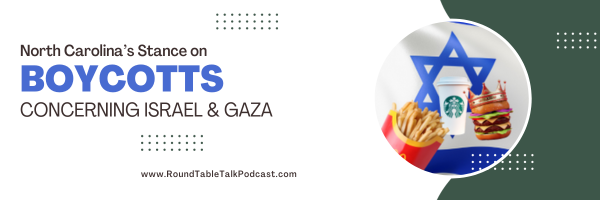
Israel and Gaza are in the news a lot these days, and most recently that extends down to us all: International Boycotts. Let’s talk about something that’s been making waves in the world of big businesses lately – and consider North Carolina’s response. You’ve probably heard about some of the big names like McDonald’s and Starbucks getting caught up in boycotts because of the conflict in Gaza. This isn’t just about a couple of companies, though. It’s a much bigger picture, and it affects us right here in North Carolina too.
So, what’s the deal? Well, according to an article from “The Conversation” in November 2023, McDonald’s got some heat because one of their Israeli franchisees was helping out the Israel Defense Forces. And Starbucks? They got tangled in a social media mix-up over a post related to Palestine. This led to people in countries like Lebanon, Saudi Arabia, and even the UK, deciding to stop buying from these chains.
But wait, there’s more. It’s not just fast-food joints. Big names like KFC, Pizza Hut, Burger King, Coca-Cola, Pepsi, and even tech giants like Google and Amazon are facing boycotts. Some are being targeted because of the U.S. government’s support for Israel, while others are being called out for working with the Israeli government and military.
This isn’t something new, though. Boycotts have been a tool for a long time. Remember when Coca-Cola was boycotted by the Arab League for over two decades because they did business in Israel? Or how American brands were pulled from shelves during the Iraqi invasion? It goes both ways too. Companies like Ben and Jerry’s have pulled out of Israeli settlements in the past.
Here in North Carolina, we’ve got our own take on this. Our state has a law called the “Divestments from Companies Boycotting Israel Act of 2017”. Basically, it says our state won’t do business with companies that boycott Israel. It’s our way of saying we stand with our friends and believe in free trade.
But, with all these boycotts happening around the world, it makes you think, right? It’s not just about a company selling burgers or coffee. It’s about how businesses get caught in these big global issues and what that means for everyone, including us.
So, while North Carolina has a clear stance against boycotting Israel, the world of global boycotts is pretty complicated. It shows us how businesses can get tangled up in politics and why we need to keep our eyes open and think about the bigger picture.
That’s it for now. Let’s keep the conversation going and think about how all this affects us and our choices. Keep up on how this – and so many other national and international affairs – affect us here in North Carolina when you follow the Roundtable Talk Podcast. You can always find the latest episode HERE.


Leave a Reply